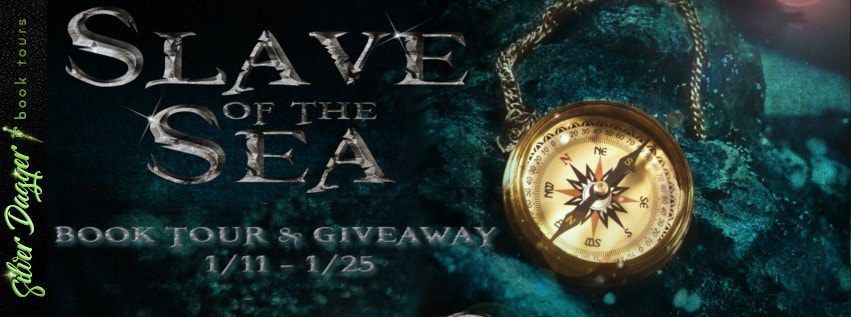Originally posted by Allison D. Reid:
Have your eclipse-watching glasses ready? Or maybe with all the warnings about faulty viewing glasses, you’re just going to hide from it and watch the event on NASA TV. Either way, today’s rare celestial event is fascinating; something beautiful and awe-inspiring…for us. But how did our medieval counterparts feel about it?
 This might largely depend on who, and where, you were at the time an eclipse occurred. There were some, like an Anglo Saxon scholar named Bede, who understood that a solar eclipse happened because the moon was passing between the sun and the earth. In one of his scientific texts, he described how “a solar eclipse occurs when the Sun is hidden by the intervention of the Moon, and a lunar eclipse when the Sun, Earth and moon are aligned with Earth in the centre.”
This might largely depend on who, and where, you were at the time an eclipse occurred. There were some, like an Anglo Saxon scholar named Bede, who understood that a solar eclipse happened because the moon was passing between the sun and the earth. In one of his scientific texts, he described how “a solar eclipse occurs when the Sun is hidden by the intervention of the Moon, and a lunar eclipse when the Sun, Earth and moon are aligned with Earth in the centre.” But not everyone would have been knowledgeable about astronomy, and for those who weren’t, the darkening of the sky in the middle of the day would have been a frightening and ominous event. Even if they hadn’t read it for themselves, they would have been taught stories from the Bible concerning periods of darkness, such as during the ten plagues of Egypt, or when Christ died after being crucified. Apocalyptic accounts associated the darkening of the sun with the end of the world. “The Fifteen Signs before Doomsday” was a Middle English text which described the first sign of the apocalypse. The “Sun will give no light and will be cast down to Earth – while you now see it [the Sun] as pleasing and bright, it will become as black as coal.”
But not everyone would have been knowledgeable about astronomy, and for those who weren’t, the darkening of the sky in the middle of the day would have been a frightening and ominous event. Even if they hadn’t read it for themselves, they would have been taught stories from the Bible concerning periods of darkness, such as during the ten plagues of Egypt, or when Christ died after being crucified. Apocalyptic accounts associated the darkening of the sun with the end of the world. “The Fifteen Signs before Doomsday” was a Middle English text which described the first sign of the apocalypse. The “Sun will give no light and will be cast down to Earth – while you now see it [the Sun] as pleasing and bright, it will become as black as coal.”It didn’t help that these negative associations with eclipses, and the superstitions people held about them, seemed to be supported by significant events throughout medieval history. Louis of Bavaria, who was Charlemagne’s son and a great Emperor, died shortly after experiencing an eclipse. It was said that he died of fright. Adding to the distress of the Emperor’s death, his sons began a three-year dispute over his succession, which eventually led to the division of Europe into three large areas: Germany, Italy, and France.
The Anglo Saxons later linked an eclipse to a Viking invasion that occurred in 879.
 Another solar eclipse happened on August 2, 1133, which could be seen in England and Germany. For both countries, it turned out to be a particularly bad omen. In England, the eclipse could be seen the day after King Henry I departed, and in fact he died in Normandy shortly after. The Germans blamed the same eclipse for the sack of Augsburg and the subsequent massacre of its people by Duke Frederick.
Another solar eclipse happened on August 2, 1133, which could be seen in England and Germany. For both countries, it turned out to be a particularly bad omen. In England, the eclipse could be seen the day after King Henry I departed, and in fact he died in Normandy shortly after. The Germans blamed the same eclipse for the sack of Augsburg and the subsequent massacre of its people by Duke Frederick.In 1140 William of Malmesbury wrote, ‘There was an eclipse throughout England, and the darkness was so great that people at first thought the world was ending. Afterwards they realised it was an eclipse, went out, and could see the stars in the sky. It was thought and said by many, not untruly, that the king would soon lose his power.”
An eclipse was even blamed for the fall of Constantinople in 1453, though in truth a postern gate had been carelessly left open, allowing Turkish soldiers entrance to the city.
There was also an element of inconvenience associated with the darkness of an eclipse. In the 11th century, one observer wrote, “the Sun was obscured for the space of three hours; it was so great that any people who were working indoors could only continue if in the meantime they lit lamps. Indeed some people went from house to house to get lanterns or torches. Many were terrified.”
I wonder if in the Middle Ages they knew to protect their eyes by not looking directly at an eclipse. Even now with all our knowledge, it is reported that about 100 people in the United States go completely blind each time there is an eclipse, and even more sustain damage to their retinas. I can imagine that having even a small number of people go blind in a medieval village or city after an eclipse occurs would only add to the sense of dread that fueled existing medieval beliefs and superstitions.
Want to know more about the Middle Ages? Check out the Medieval Monday Index for additional topics.

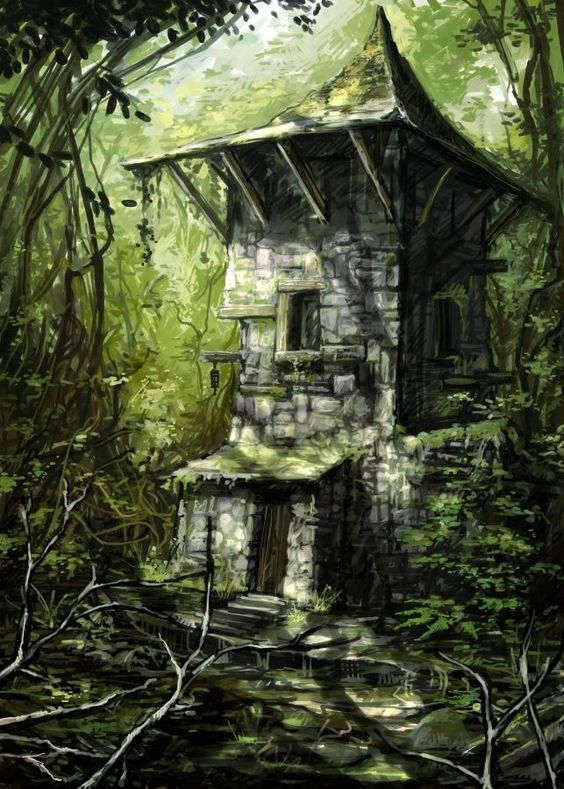



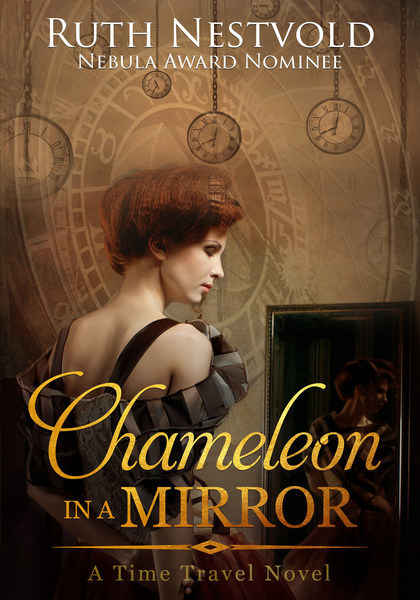







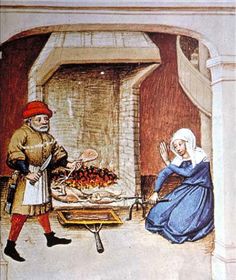 Fire was crucial to survival in the Middle Ages. With electricity and gas-powered devices still far into the future, open flame was the most common source of heat for cooking, industry, and protection against the cold. Fires were a bit more difficult to set in an era before matches, particularly if everything was wet. Fire-steels, flint, or pyrite (struck against iron to produce a spark) might be carried in a leather pouch along with tinder. Tinder could be dried brush, straw, birch bark, rotten wood, pine needles, wood shavings, small twigs, or char-cloth. Char-cloth was made by briefly catching a bit of clean linen on fire, then putting the fire out. The resulting bit of blackened fiber could be saved for later and easily caught fire. Once a fire had been successfully lit, the resulting coals were protected with fire covers or other means. It was more convenient to revive a fire from still-hot coals than to start one from scratch.
Fire was crucial to survival in the Middle Ages. With electricity and gas-powered devices still far into the future, open flame was the most common source of heat for cooking, industry, and protection against the cold. Fires were a bit more difficult to set in an era before matches, particularly if everything was wet. Fire-steels, flint, or pyrite (struck against iron to produce a spark) might be carried in a leather pouch along with tinder. Tinder could be dried brush, straw, birch bark, rotten wood, pine needles, wood shavings, small twigs, or char-cloth. Char-cloth was made by briefly catching a bit of clean linen on fire, then putting the fire out. The resulting bit of blackened fiber could be saved for later and easily caught fire. Once a fire had been successfully lit, the resulting coals were protected with fire covers or other means. It was more convenient to revive a fire from still-hot coals than to start one from scratch.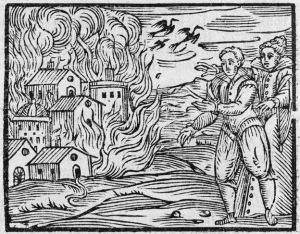 As much as fire was a necessity to life, it was also a significant hazard in the medieval world. Stone and brick were prohibitively expensive building materials for the average person. Most buildings were made of wattle and daub with thatch roofs, and straw beds were often pulled close to hearth fires—all of these materials burned quickly once lit. In cities, the buildings were also built very close together, so if one building went up in flames, those near it would likely burn down as well. Many towns throughout Europe were at one point or other devastated by fire, whether by lit by accident, invaders, or even lightning. After 1213, London forbade thatch roofing in favor of shingles and tile, though other towns were slow to do the same.
As much as fire was a necessity to life, it was also a significant hazard in the medieval world. Stone and brick were prohibitively expensive building materials for the average person. Most buildings were made of wattle and daub with thatch roofs, and straw beds were often pulled close to hearth fires—all of these materials burned quickly once lit. In cities, the buildings were also built very close together, so if one building went up in flames, those near it would likely burn down as well. Many towns throughout Europe were at one point or other devastated by fire, whether by lit by accident, invaders, or even lightning. After 1213, London forbade thatch roofing in favor of shingles and tile, though other towns were slow to do the same.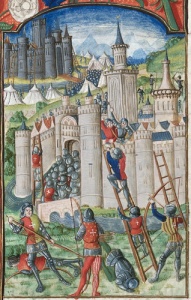 While stone buildings were safer, they were not impervious to fire, and even castles could be destroyed by it. Starting fires was often a tactic used by those laying siege to a castle or keep. Catapults could fling flaming objects over the stone walls in the hopes of catching something flammable on the other side. Once started, such fires were very difficult if not impossible to extinguish.
While stone buildings were safer, they were not impervious to fire, and even castles could be destroyed by it. Starting fires was often a tactic used by those laying siege to a castle or keep. Catapults could fling flaming objects over the stone walls in the hopes of catching something flammable on the other side. Once started, such fires were very difficult if not impossible to extinguish.
